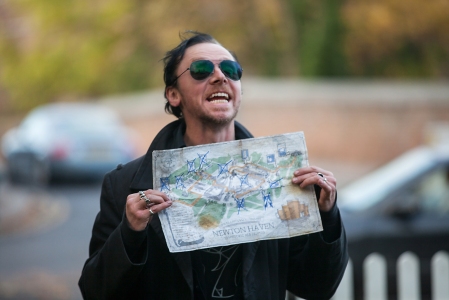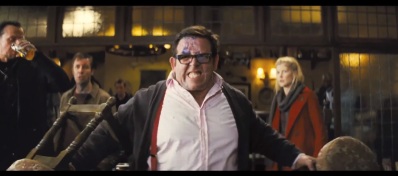 |
| And so it begins…I mean ends. |
The World’s End is the appropriately titles end of the Cornetto Trilogy, a trio of films including Shaun of the Dead and Hot Fuzz created by Simon Pegg, Nick Frost, and director Edgar Wright. Each film centers on the not quite grown up antics of Simon Pegg and Nick Frost as they struggle with life and an inevitable apocalyptic turn. That may sound dour, but Wright and Co. prefer to find humor rather than dread in grim circumstance. The World’s End continues this tradition, lampooning a sci-fi premise by crashing a pub crawl into it, but also bringing slicker production values and a further decade of experience. Though less hilariously manic than the previous films, it spends more time on building empathetic characters. After three films, Wright’s man-child trilogy finally grows up just a little.
 |
| Probably a bad choice for your AA meeting movie night |
The shockingly strong premise concerns the lamentations of Gary King (Pegg), who’s life never got better than a legendary pub crawl at the end of his school career. King decides to coerce his now aged compatriots, including Nick Frost playing against type as the straight man, into retrying the pub crawl they washed out on two decades ago. The absurdity of pushing 40 and embarking on a drunken night of debauchery gives the film momentum even through the supernatural turn, paying off as the progressively drunker Brits make stupid, belligerent decisions. At stake here is the issue of conformity versus rebellion. King willfully rejects the lives of his four suit-and-tie friends even when he begrudgingly admits his jealousy, but the other road has left him as a 40 year old burnout. His need to retry the pub crawl dredges up into sharp relief the ways the past shaped all five of them, and how they’ve tried to live with (or around) that baggage. This homecoming is only amplified when they are confronted by the enslaving antagonists, as both thrusts explore the idea of supposedly civilizing adulthood. In the events leading up to the Outer Limits, the movie fairs very well as a low key dramedy about damaged people and that throughline sustains the film even when the brawling starts. You may even regret the genre turn, but luckily the two halves of the movie are simpatico. The problem lurking in the English countryside considers the same themes that drive the pub crawl, serving to accentuate social commentary through sci-fi hypotheticals.
 |
| Sitting isn’t everything, it’s the only thing. |
Dramedy or no, Edgar Wrightisms abound. Just like the previous two movies, the genre fair is satire but the order of the day is professionalism. Brawls are huge destructive affairs, put together with help from a choreographer on loan from Jackie Chan and sampling from cage fights and curb stomps alike. Pegg and Frost are serious, but sloppy fence vaulting and a hilarious fight to drink a beer in turmoil show off their precise physical comedy. Whether it’s punching people in a urinal or drunkly telling off a big lamp, everyone here is having fun and it shows. That’s why it’s interesting that The World’s End subject matter is the struggle for maturity, since Edgar and Co. seem to have so much fun not being mature. The message from the film is actually quite ambiguous, ceding bravery for the people that try to live their life straight edge but also giving value to the impulsive brashness of Gary King. Inbetween trying to upstage Scott Pilgrim and creating creepy vibes, The World’s End may be suggesting that there’s no ideal path and if there was people would belligerently reject it anyway. Indeed one of the through lines is how remarkable little people change, even in the face of the passage of time and traumatic events. It’s a melancholy question to address, in the middle of beer and beatings, but The World’s End suggests that even in the face of such cyclical inertia, people can still at least evolve. The fact that some of the elements end up tying together a little too predictably is an unfortunate side effect of the plot deliberate funneling to these concepts, but the philosophical thoughts will stick with you past the sour taste of some jokes and plot points falling flat.
 |
| You know how we guys always have to go to the bathroom together |
Careful consideration has gone into the themes of The World’s End, but really these ideas are what make the movie interesting, not necessarily good. The movie is good because of the reliable British wit, attention to small details/callbacks (pay attention to the pub names), and the excellent cast. The supernatural element is slick and the satire well-constructed; much of the joy of the film comes from the boys poking outside the expected responses for a sci-fi movie and seeing what happens, then dealing with it like talkative drunk geeks. The reason the World’s End will stick with you though is because it’s constructed to put ideas about conformity and potential into the forefront alongside comedy, instead of just as plot engines. The World’s End may not have a perfect answer for its bitter dilemmas, but the mix of comedy and philosophy give the film a unique, hoppy aftertaste.
3/4
**Originally Published on Synthetic Error September 7, 2013
Comments
Post a Comment